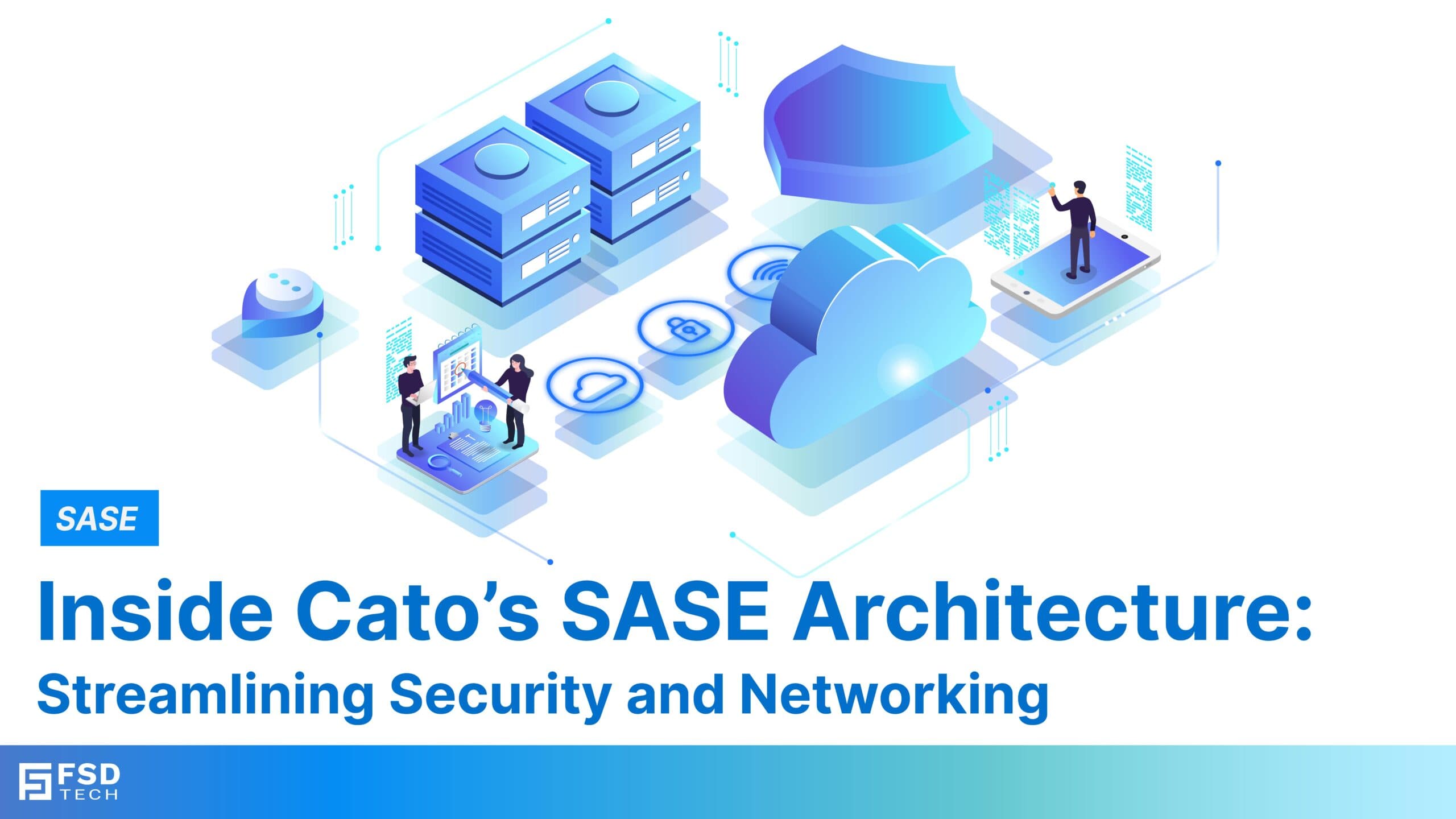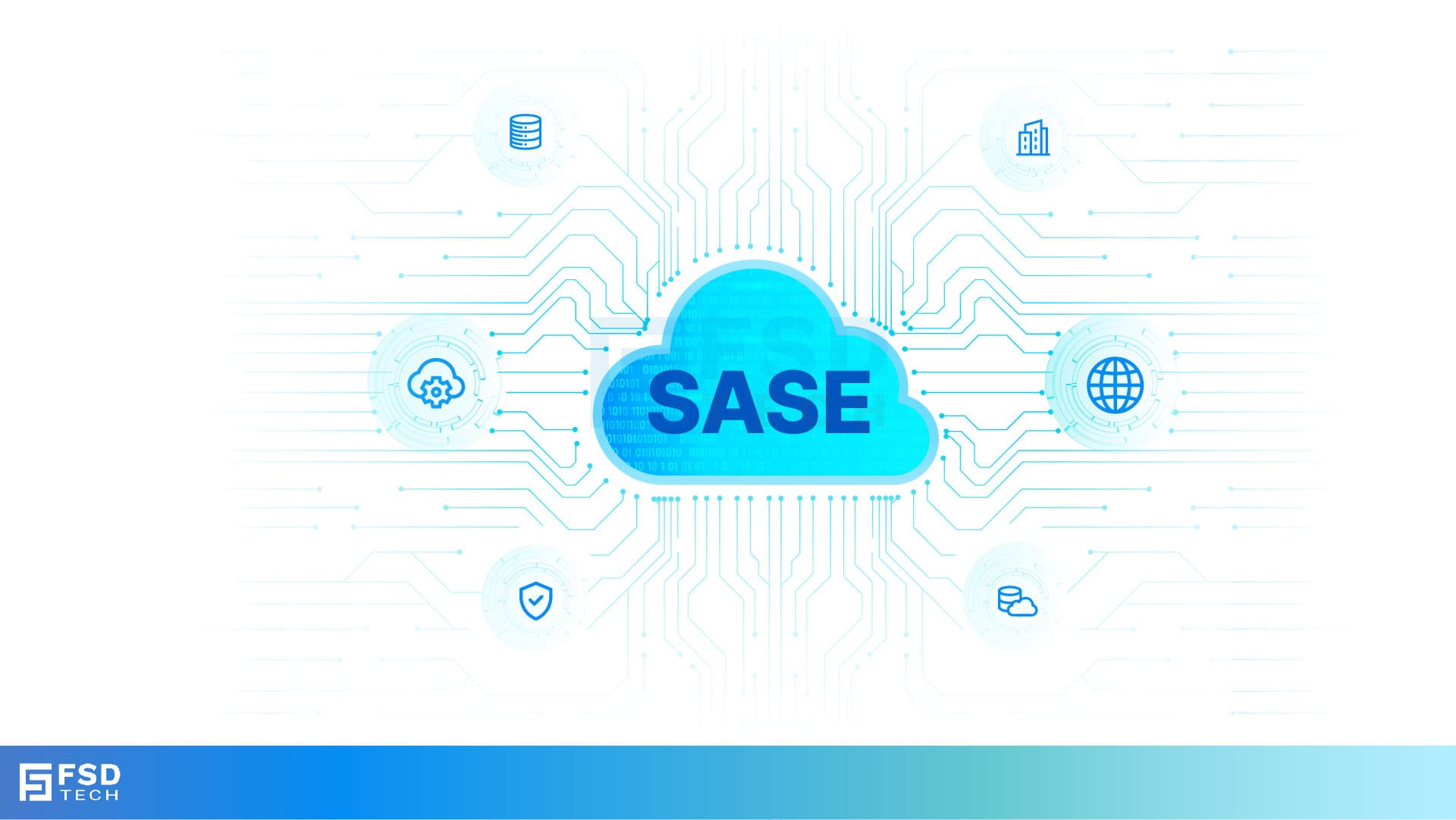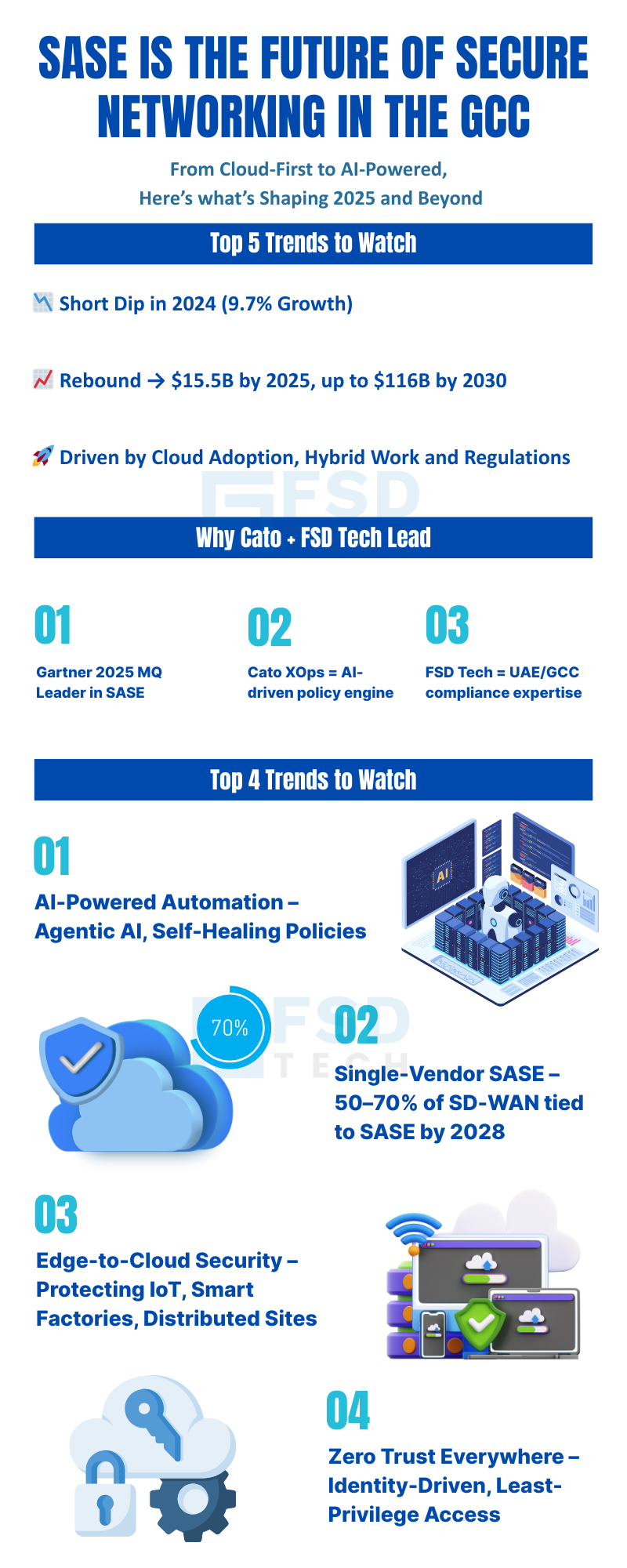
Inside Cato’s SASE Architecture: A Blueprint for Modern Security
🕓 January 26, 2025

The Gulf Cooperation Council (GCC) is at a pivotal moment in its digital transformation journey. Ambitious government initiatives, a rapidly expanding fintech sector, and the normalization of hybrid work have made secure, agile, and compliant connectivity a board-level priority. As enterprises in the UAE, Saudi Arabia, and across the region accelerate their shift to cloud-first operations, the need for a modern, unified approach to networking and security is undeniable.
Secure Access Service Edge (SASE) has emerged as the architectural backbone for this new era. By converging networking and security into a single, cloud-native platform, SASE enables organizations to protect users, data, and applications—wherever they reside. For CISOs, security directors, IT architects, and CTOs in the GCC, SASE is no longer a future consideration; it is a present-day imperative.
Cato Networks, recognized as a 2025 Gartner Magic Quadrant Leader for SASE, has redefined what’s possible with a true cloud-native, unified architecture. FSD Tech, as a regional implementation partner, brings deep expertise in regulatory alignment, digital innovation, and AI-driven security. Together, they empower GCC enterprises to navigate the complexities of next-generation networking—enabling secure, scalable, and compliant operations from Dubai to Riyadh and beyond.
After years of double-digit expansion, the global SASE market experienced a notable slowdown to approximately 9.7% in Q2 2024. This dip reflects broader macroeconomic pressures and cautious enterprise spending. However, this short-term deceleration masks powerful, long-term drivers that are particularly acute in the GCC:
Despite the recent slowdown, industry analysts remain bullish on SASE’s future. Gartner and GlobeNewswire project a global SASE market CAGR of 23.6–26%, with revenues expected to reach USD 15.5 billion by 2025 and between USD 44 billion and USD 116 billion by 2030. In the GCC, this growth is mirrored by aggressive digital economy initiatives and regulatory reforms, accelerating SASE adoption across government, telecom, fintech, and manufacturing sectors.
The unique dynamics of the GCC are driving rapid SASE adoption:
Curious how these SASE trends will impact your sector? Share your details and we’ll send you a tailored outlook for your industry. Click Here
Cato Networks stands out as a 2025 Gartner Magic Quadrant Leader for SASE Platforms, recognized for its end-to-end, cloud-native architecture built from the ground up. Unlike legacy vendors that bolt security onto existing networks, Cato delivers a unified platform that seamlessly integrates SD-WAN, security, and Zero Trust access—ideal for the distributed, dynamic environments of GCC enterprises.
Key differentiators include:
A leading UAE fintech firm faced the challenge of rapid expansion across the GCC, with a need for secure, compliant access for remote employees, branch offices, and cloud workloads. FSD Tech guided the deployment of Cato’s unified SASE platform, delivering:
This deployment exemplifies how Cato SASE, enabled by FSD Tech, empowers regional enterprises to scale securely and efficiently.
AI is rapidly becoming the cornerstone of next-generation SASE platforms. Cato’s XOps engine exemplifies the move toward agentic AI—enabling autonomous policy tuning, real-time anomaly detection, and adaptive security enforcement. For GCC organizations, this means:
The sophistication of cyber threats in the GCC is escalating, with attackers leveraging AI to bypass traditional defenses. SASE platforms with integrated AI capabilities offer:
A Dubai government agency, tasked with enabling secure hybrid work, partnered with FSD Tech to deploy an AI-driven Zero Trust SASE solution. The result:
This deployment demonstrates how AI-powered SASE can deliver both security and agility for mission-critical government operations.
Want to see how AI-driven SASE can strengthen your compliance and security posture? Share your details and we’ll prepare a customized assessment for your environment. Click Here
The SASE market is rapidly converging around unified, single-vendor stacks. By 2028, 50–70% of new SD-WAN purchases in the GCC are expected to be part of integrated SASE solutions. The drivers:
For GCC enterprises with distributed operations, single-vendor SASE delivers:
A major GCC telecom operator migrated its legacy SD-WAN to a unified, single-vendor SASE platform with FSD Tech’s support. The outcome:
This case highlights the tangible benefits of platform convergence for large, complex organizations.
Modern GCC enterprises operate across on-premises, cloud, and edge environments. SASE platforms are evolving to provide:
Zero Trust is no longer optional. SASE platforms now embed Zero Trust principles, ensuring:
A UAE-based manufacturer leveraged FSD Tech and Cato SASE to secure its smart factory and IoT initiatives. Key results:
This deployment underscores the critical role of SASE in enabling digital innovation at the edge.
Regulatory compliance is a top concern for GCC enterprises, particularly in sectors like finance, healthcare, and government. SASE platforms facilitate compliance by:
FSD Tech works closely with GCC organizations to:
This approach ensures that enterprises can innovate confidently while meeting the highest standards of regulatory alignment.
FSD Tech’s expertise extends beyond deployment to ongoing innovation:
Every GCC enterprise is unique. FSD Tech tailors SASE architectures to:
This localized, consultative approach ensures that SASE delivers maximum value and resilience.
Looking ahead, SASE will become the foundational platform for digital resilience in the GCC:
To stay ahead, GCC security leaders should:
Ready to accelerate your SASE transformation? Schedule a quick call with our experts to explore next steps. Schedule Now

The rapid shift to cloud-first strategies, hybrid work models, and stringent regulatory requirements are driving SASE adoption across the GCC. Enterprises need unified, scalable, and compliant security and networking to support digital transformation initiatives, making SASE a strategic priority.
Cato Networks offers a true cloud-native, unified SASE platform recognized as a 2025 Gartner Magic Quadrant Leader. Its architecture is built from the ground up for scale, agility, and resilience, making it ideal for distributed, compliance-driven environments in the UAE and GCC.
FSD Tech acts as a strategic partner for GCC enterprises, guiding the deployment, customization, and optimization of Cato SASE solutions. Their expertise ensures alignment with local regulations, digital innovation goals, and the unique operational needs of regional organizations.
AI-powered security enables real-time threat detection, autonomous policy enforcement, and predictive analytics. This is essential for defending against sophisticated, AI-driven cyber threats that are increasingly targeting enterprises in the Middle East.
Agentic AI refers to autonomous, self-optimizing AI engines—such as Cato’s XOps—that continuously tune security policies, detect anomalies, and respond to threats without manual intervention. This enhances resilience and reduces the operational burden on security teams.
Single-vendor SASE platforms unify networking and security into a single stack, reducing integration complexity, streamlining management, and providing consistent policy enforcement across all locations and users. This is especially valuable for distributed enterprises in the GCC.
Edge-to-cloud integration enables secure, seamless connectivity for IoT devices, remote sites, and cloud workloads. SASE platforms provide consistent security and optimized performance, supporting digital innovation across sectors like manufacturing and smart cities in the UAE.
SASE platforms embed Zero Trust principles by enforcing identity-driven, least-privilege access and continuously monitoring user and device behavior. This reduces attack surfaces and ensures adaptive, context-aware security for hybrid and distributed environments.
SASE centralizes policy enforcement, access controls, and audit logging, making it easier to meet GDPR, HIPAA, and regional data protection mandates. This is vital for sectors like fintech, government, and healthcare in the UAE and GCC.
Yes. FSD Tech deployed Cato SASE for a UAE fintech firm, enabling secure, compliant access for remote employees and branch offices. The solution reduced incident response time by 40% and streamlined regulatory reporting, supporting rapid regional expansion.
FSD Tech integrates Cato SASE with local regulatory frameworks, enabling token-based compliance, data residency, and automated audit reporting. Their consultative approach ensures every deployment aligns with regional mandates and business objectives.
Despite a temporary slowdown to 9.7% growth in Q2 2024, the SASE market is projected to rebound strongly, with a CAGR of 23.6–26% through 2030. Regional drivers include cloud adoption, regulatory reforms, and the need for AI-powered security.
SASE platforms provide secure, real-time connectivity for distributed sites, IoT devices, and cloud analytics. For example, a UAE manufacturer used FSD Tech and Cato SASE to support smart factory initiatives, ensuring compliance and operational agility.
CISOs should prioritize unified, cloud-native platforms with AI-powered automation, strong Zero Trust integration, and proven regional expertise. Partnering with providers like FSD Tech ensures solutions are tailored for local compliance and operational needs.
By adopting single-vendor, AI-driven SASE platforms—backed by regional experts like FSD Tech—enterprises can achieve secure, agile, and compliant operations. This positions them to capitalize on digital transformation opportunities and defend against evolving threats.

Anas is an Expert in Network and Security Infrastructure, With over seven years of industry experience, holding certifications Including CCIE- Enterprise, PCNSE, Cato SASE Expert, and Atera Certified Master. Anas provides his valuable insights and expertise to readers.
Share it with friends!
share your thoughts